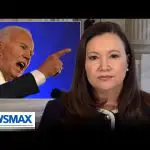In the recent whirlwind of political drama, the spotlight has been shining brightly on Pete Hegseth, a notable figure in the Trump administration who has drawn both criticism and curiosity from the media. As a senior editor at Reason Magazine commented, it seems like the press has been gearing up to take Hegseth down, scrutinizing his every move and decision with a fine-tooth comb. This level of attention raises questions about the motivations behind such coverage, especially when juxtaposed against the apparent lack of interest in the actions of others involved in potential controversies.
The conversation kicked off with discussions surrounding a leaked chat that revolved around sensitive military information, which Hegseth allegedly shared with family members. On the surface, it might seem fair to hold anyone accountable for such leaks, but the media frenzy appears to be targeting Hegseth more aggressively than the root cause of the issue. Despite similar breaches of protocol by others, such as Michael Waltz, it appears that the media is more inclined to attack Hegseth because of his status as a controversial and high-profile personality linked to former President Trump.
It’s no secret that a significant part of the media seems to resent Hegseth—perhaps due to his unconventional resume or the perception that he doesn’t fit the usual mold for someone in charge of Pentagon affairs. The sentiment seems to be that if you lack the traditional background in government service, your actions will be held to a different, often harsher, standard. Such a dynamic can be challenging in Washington, where mediocrity is sometimes overlooked if you fit the right profile.
But the story behind the scenes is where things get particularly interesting. Discussions about foreign policy and the potential for conflict, particularly concerning Iran, highlight deeper ideological battles that are raging within the political sphere. While the media churns out sensational headlines about Hegseth’s supposed missteps, they inadvertently sidestep important discussions about America’s foreign policy direction. It’s like everyone is focused on the shadow puppet show while ignoring the wild dance going on behind the curtain.
Amid all the drama, there’s the ongoing debate about classified vs. unclassified information, with some claiming that everything is over-classified these days. Given the stakes involved in national security, there seems to be a legitimate cause for concern when someone shares sensitive military plans through an unsecured system. However, the larger dilemma remains: if the purpose of Hegseth’s controversial share was indeed political fodder for the media, then is the system working as it should, or is it just another example of deeper political theater?
In a world where leaks and controversies seem to be the order of the day, it can be easy to lose sight of the real issues at hand. The media’s inclination to sensationalize the actions of individuals like Hegseth may overshadow critical discussions that need to be had about national security, accountability, and the direction of U.S. foreign policy. As the battle continues between the media’s desire for drama and the public’s need for clarity, one thing is certain: the political stage remains as chaotic and volatile as ever.




